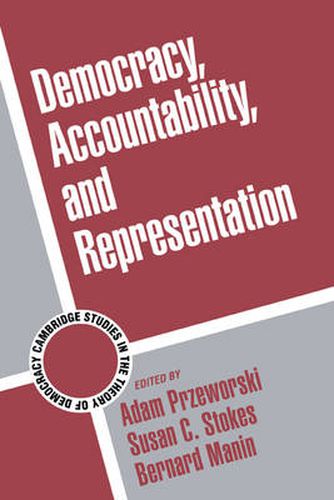Readings Newsletter
Become a Readings Member to make your shopping experience even easier.
Sign in or sign up for free!
You’re not far away from qualifying for FREE standard shipping within Australia
You’ve qualified for FREE standard shipping within Australia
The cart is loading…






This book examines whether the mechanisms of accountability characteristic of democratic systems are sufficient to induce the representatives to act in the best interest of the represented. The first part of the volume focuses on the role of elections, distinguishing different ways in which they may cause representation. The second part is devoted to the role of checks and balances, between the government and the parliament as well as between the government and the bureaucracy. The contributors of this volume, all leading scholars in the fields of American and comparative politics and political theory, address questions such as, whether elections induce governments to act in the interest of citizens. Are politicians in democracies accountable to voters in future elections? If so, does accountability induce politicians to represent citizens? Does accountability limit or enhance the scope of action of governments? Are governments that violate campaign mandates representative? Overall, the essays combine theoretical discussions, game-theoretic models, case studies, and statistical analyses, within a shared analytical approach and a standardized terminology. The empirical material is drawn from the well established democracies as well as from new democracies.
$9.00 standard shipping within Australia
FREE standard shipping within Australia for orders over $100.00
Express & International shipping calculated at checkout
Stock availability can be subject to change without notice. We recommend calling the shop or contacting our online team to check availability of low stock items. Please see our Shopping Online page for more details.
This book examines whether the mechanisms of accountability characteristic of democratic systems are sufficient to induce the representatives to act in the best interest of the represented. The first part of the volume focuses on the role of elections, distinguishing different ways in which they may cause representation. The second part is devoted to the role of checks and balances, between the government and the parliament as well as between the government and the bureaucracy. The contributors of this volume, all leading scholars in the fields of American and comparative politics and political theory, address questions such as, whether elections induce governments to act in the interest of citizens. Are politicians in democracies accountable to voters in future elections? If so, does accountability induce politicians to represent citizens? Does accountability limit or enhance the scope of action of governments? Are governments that violate campaign mandates representative? Overall, the essays combine theoretical discussions, game-theoretic models, case studies, and statistical analyses, within a shared analytical approach and a standardized terminology. The empirical material is drawn from the well established democracies as well as from new democracies.